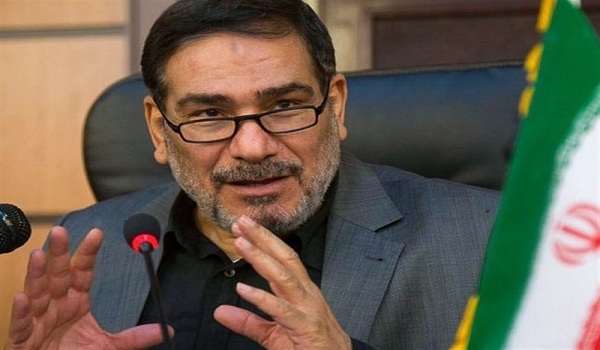TEHRAN – Secretary of Iran’s Supreme National Security Council highlighted the US failure to form a regional coalition against the so-called “Islamic Republic” (ISIS, Daesh), predicting that America would have to pull its forces out of more regions in the Middle East in 2019.
In an interview with the Tasnim News Agency, Ali Shamkhani outlined the major problems that the US is facing in the Middle East, describing Washington’s plan to transfer its military forces from Syria to Iraq as part of a propaganda campaign.
Asked about his view on US President Donald Trump’s decision to withdraw American troops from Syria, Shamkhani said it results from the fact that “the realities on the ground in the region have been imposed on the United States.”
“One of the main realities in Syria and elsewhere in the region is that the US allies have been defeated by the wills of nations, and have therefore inflicted heavy political, military and financial costs on the US,” he added, according to Tasnim.
Referring to Trump as a “businessman who cannot tolerate costs with no gains”, Shamkhani said the US military pullout from Syria is a result of the political realities.
US plan to deploy troops from Syria to Iraq a propaganda
He further slammed the US plan to deploy the troops from Syria to Iraq as a propaganda, stressing that the Iraqi government, parliament and nation are vehemently opposed to the US military presence in the Arab country.
“Americans face a tough job in this regard. I believe that the US will have to get out of other places of the region as well by the end of 2019,” he noted.
Shamkhani further highlighted the US failure to form regional alliances against Iran, saying the Arab states are not united when it comes to siding with the US against Tehran.
Heunderlined that Iran has always taken the hostile military threats serious, which is why it continuously tries to boost the deterrent power, be it the missile industry or the advanced air defense systems.
“Today, Iran is able to decisively combat any threat in the military sphere, which is quite obvious to Trump, the US ruling system, and to Tel Aviv,” he noted, saying that is why the US and Israel are making anti-Iran threats with a “loud voice”.
“Definitely because they know that they cannot enter a war, they raise the sound of threats. This is Trump’s technique. Trump is not made for wars. He issues threats to avoid a war,” Shamkhani concluded.
Shamkhani: Iran to Keep Working with Syria against Terroris, Israel
Shamkhani went on to say that Iran is in Syria at the request of the Damascus government and will keep working with the Arab country in countering terrorism and the Zionist entity.
He explicated Iran’s plans to help the Syrian government in the battle against terrorism and to fight off the Israeli attacks on the Syrian territories.
Shamkhani underlined that Iran provides “advisory help” for Syria in the fight against terrorism at the request of the Damascus government and with the purpose of supporting the Arab country and its people.
He underlined that lawful presence in Syria is the “basic principle” for the Islamic Republic, noting that all parties acknowledge that Iran has behaved successfully in such process.
“We will stay in Syria and fight against terrorism as long as the legitimate Syrian government would make such request,” Shamkhani added.
As regards the Israeli military strikes on Syria, Shamkhani said Iran believes that such attacks are meant to help the terrorists.
“Israel is clearly taking steps to serve the interests of terrorists and to counter the Syrian government and army,” he underscored.
Iran Has Plans to Neutralize US Oil Sanctions
 Elsewhere in the interview, Shamkhani said that Iran has devised initiatives to foil the US sanctions on its oil exports, noting that the country has multiple ways to sell its crude.
Elsewhere in the interview, Shamkhani said that Iran has devised initiatives to foil the US sanctions on its oil exports, noting that the country has multiple ways to sell its crude.
“The Islamic Republic of Iran has designed and put into practice initiatives that would neutralize the illegal US sanctions against Iran’s export of oil,” Shamkhani clearified.
He noted that although the US pressures may inflict some costs on Iran, they could not undermine the Islamic Republic’s resolve.
As regards the speculation that Iran could block the Strait of Hormuz in case of a halt to the export of Iranian oil, Shamkhani said, “Although the Islamic Republic of Iran’s military capabilities and extensive capacities have been proved to professional observers and there is no need to mention and repeat it, a cut in the export of oil would not be necessarily tantamount to a blockage of Strait of Hormuz.”
“There are multiple methods to make that (blockage of Hormuz Strait) happen, and we hope we would not have to use them,” the top official concluded.
H.M

